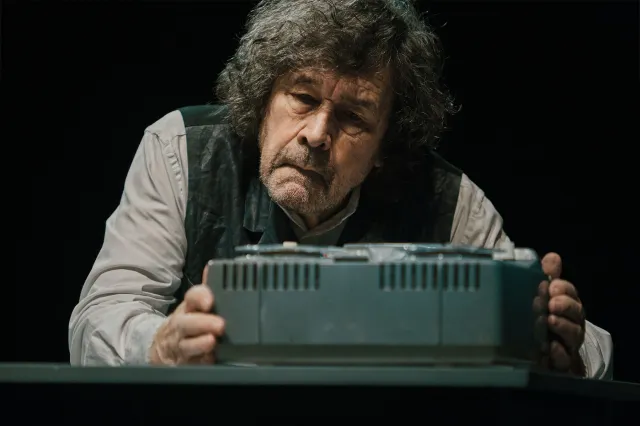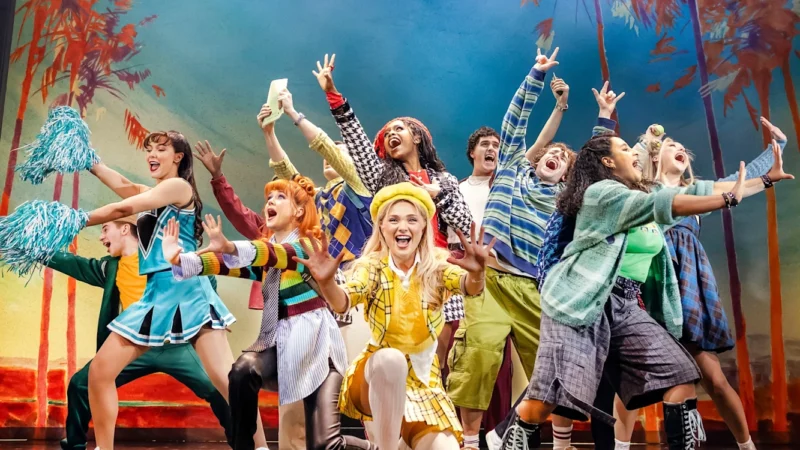Barbican Centre
When London feels like it’s having a hot grey bowl of diffused sunlight pressed down upon it, many flee to the AC-wafted basement of the Barbican. But what is clicking along down there pulls more of a crowd than just those on the hunt for a cool troglodyte refuge.
Samuel Beckett returns to one of his historic homes. Well, obviously not the long-dead Irish playwright, but his famous work Krapp’s Last Tape. A little like an experimental Leer, this is a pinnacle for established older male actors, revelling in their stage presence and rumbling tones. Interestingly our Krapp Stephen Rea has met and worked with the famous dramatist and has a unique USP to set this iteration (directed by Vicky Featherstone) resolutely aside from the many other performances.
The premise is deceptively simple, Krapp records a tape once a year on a rickety old tape recorder (would a modern version be Krapp’s last voice note?). After eating 2, or 3 or 4 bananas, he listens back to his tapes before recording his last one at the ripe old age of 69 (thankfully life expectancy has increased since 1958 when the play was written). We disappointingly only get one glimpse into the past, 10 years earlier, normally recorded by another younger actor or contrived by whoever is playing Krapp. But not this time, Rea optimistically and portentously recorded the younger Krapp’s parts 10 years ago, and now must be feeling pretty darn smug.
Jamie Vartan has the desk and overhead light raised above the normal floor and Paul Keogan’s sharp box of light give us a clear outline of the small room and walkway up to a sliding white door upstage left. Katie Davenport has Rea in crumpled and worn looking shirt and waistcoat, and the whole effect is part Stasi interrogation room part shoddy study.
Apart from some desk draw-based comedy, and some nice slapstick around the many bananas Krapp warms himself up with, it really is Rea sat down recording his own tape and glowering at his younger selves exuberant reminiscing.
Now theatre is subjective and personal and any critic that pretends it isn’t is busy deifying themselves. I love Becket, the chasm he opened in the side of theatre in the 50s/60s, his creative control and gift with language is enrapturing. My partner does not, or at least didn’t appreciate this play. Yes, it is static, meandering, pretentious and self-indulgent, but isn’t life?
The reality of Rea huffing at his younger self’s fire and optimism pulls out more than a few rye croaks from the audience. His squandered ambitions and the constant reworking of loves lost is as pertinence as it ever was, explored in the James Joyce-like monologuing that shot Beckett into theatre’s heart. Luminous prose, weaving emotion and poetry into memory, repeated, rehashed, spliced and rewound very much like how the mind processes recollections.
As Krapp Rea is crushed, begging for death, exhausted by an overlong and disappointing life. A hunched, bitter man obsessing over the word spool, anger hollowing him out, yet tiredness creeping in.You almost wish it to truly be his last tape, but of course, Becket never allows such an obvious ending. As we pour out into the melted evening everyone is inward-facing, wondering how we would interact with our past selves. What would our tapes sound like? Everyone apart from my partner who is simply overjoyed to be free under that black muggy dinner plate sky once again fairly skipping towards the tube.
Click here for your own dose of misery and regret!



